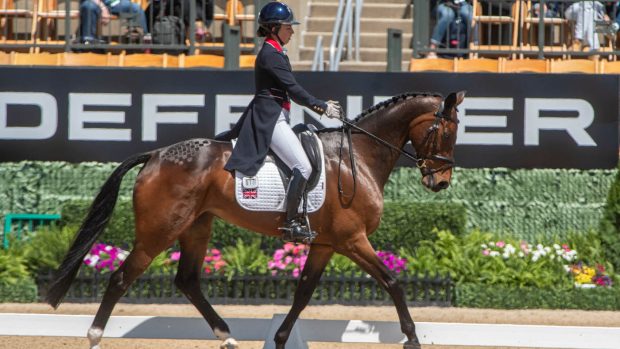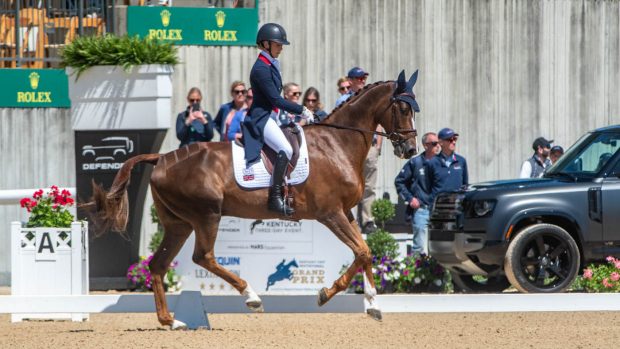“The team of Great Britain has come first in all competitions it has participated in since 1994. I would not like to be the one to break the streak of victories!” exclaimed British rider Lee Pearson (pictured) during the team dressage yesterday.
There was little chance of any such misfortune befalling the British team, who wowed the judges to finish almost 30 points clear of Germany, their nearest rivals.

Lee Pearson held on to all of the titles he won in Sydney, repeating his awesome feat of three Gold medals, while Deborah Criddle was equally dazzling, joining him as a triple gold medallist.
They both achieved double gold in the individual and freestyle events, storming to the top of their grades in imperious fashion.
“I am really surprised with the marks I have been given. They are very high but this is not a personal best for me. I didn’t expect to do that good, because I was nervous” said Criddle after producing her second gold-medal winning performance.
Pearson’s Freestyle performance was a huge personal victory. He finished almost 11 points clear of the rest of the opposition, and classed it as “the best performance of his life.
“It couldn’t be better that what we did today. I don’t think I’ve ever got higher marks than 85%! I’m very pleased with my horse. He did an excellent job. I did the ride of my life.” said the Staffordshire-based rider after his 87% performance.
Meanwhile youngster Nic Tustain, a bubbly 26-year-old lived up to expectations with two individual bronze medals as well as the team gold. Absolutely confident of the team’s ability, the rider had been grappling with the physical torments that can affect all of us severe tendonitis in her left arm. But she carried on regardless, producing three heroic performances.
“I really enjoyed the music [in the Freestyle] and so did my horse. When we are both relaxed, then things are going better for us,” she said. She also commented on her test in the team competition yesterday, saying that it was “definitely the best test I have done from the moment the competition started. [The British team] reached our potential, even though I am feeling pain in my left wrist”.
There was excitement for Sophie Christiansen too, who at just 16 years of age was facing her Olympic debut. She rode remarkably in the Grade I competitions, and although she couldn’t quite match compatriot Lee Pearson’s superior marks, she produced personal bests to win an individual bronze as well as finishing in fourth place in the Freestyle competition.
“When I first came here I wanted to do my best. These marks are a personal best for me. It is fantastic being here. I was more nervous that I should be, but I finally overcame it and I did it,” she said after her bronze-winning test.
Britain’s fourth team member, Anne Dunham also broke records in Athens, in spite of narrowly missing out on any individual medals. She had lost her original ride at the last minute due to a case of Strangles being diagnosed in her usual ride’s yard, but was lucky to be offered Ali Mill’s Olret as a substitute.
It took the combination a while to settle into each other’s stride, but as the competition wore on, they looked more and more impressive. They seemed to have suffered more than others, though, from what was described as a “lack of consistency” in the judges’ marking.
The marks seem to depend on how the judges are feeling because the score varies from one day to another there are no standards in the marking, Debbie Criddle pointed out.
In spite of the marking disappointment for Anne Dunham, she had nothing but praise for her borrowed ride: “My horse got better today. She has improved a lot. She has done really well; I cannot ask for anything more from a horse. She outdid herself each time she went out.”
Britain’s gold medal was Anne’s third consecutive Paralympic gold medal, much to the veteran’s delight. But she was sad to see the Paralympics, which, at 55, could be her last, come to a close.
“I cannot believe that I have won three medals in consecutive Paralympic Games,” she commented. “On the other hand, I am very sad that the Games is almost over. Now I have to go back home, but I have really enjoyed being here.”
Paralympic final results.
- 1. Great Britain 444.866
2. Germany 417.109
3. Netherlands 413.082
- Grade I
1. Blue Circle Boy (Lee Pearson) 77.263
2. Dr Doolittle (Jan Pike AUS) 71.895
3. Hotstuff (Sophie Christiansen) 70.0
Grade II
1. Larino (Irene Slaettengren SWE) 72.636
2. Pegasus (Joop Stokkel NED) 70.545
3. Prinz Heinrich (Nic Tustain) 68.727
Grade III
1. Figaro IX (Deborah Criddle) 74.4
2. Roquefort 16 (Bianca Vogel GER) 72.24
3. Aaron (Bettina Eistel GER) 71.12
Grade IV
1. Zanko (Ann Cathrin Lubbe NOR) 70.839
2. Burgmans Benedict (Philippa Johnson SA) 69.871
3. Dasskara (Karen Brain CAN) 69.677
- Grade I
1. Blue Circle Boy (Lee Pearson) 87.0
2. Phoenix B (Lynn Seidemann USA) 76.063
3. Dr Doolittle (Jan Pike AUS) 74.375
Grade II
1. Larino (Irene Slaettengren SWE) 78.944
2. Roquefort 16 (Hannelore Brenner GER) 76.056
3. Prinz Heinrich (Nic Tustain) 75.0
Grade III
1. Figaro IX (Deborah Criddle) 81.722
2. Aaron (Bettina Eistel GER) 77.778
3. Den Eik Heino (Bert Vermeier BEL) 74.722
Grade IV
1. Zanko (Ann Cathrin Lubbe NOR) 80.045
2. Burgmans Benedict (Philippa Johnson SA) 78.273
3. Dasskara (Karen Brain CAN) 77.227




